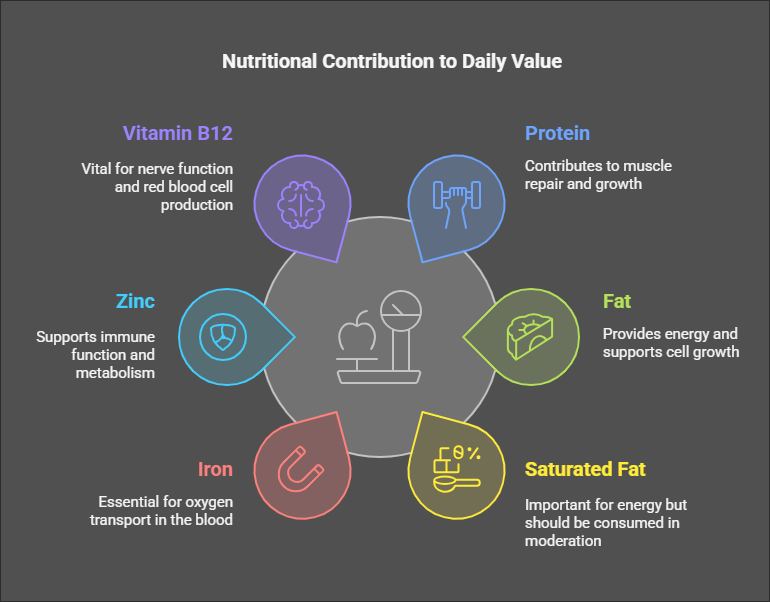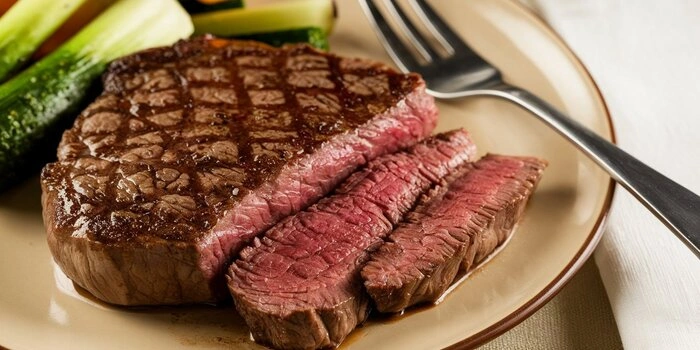Intro
Table of Contents
- 1 Intro
- 2 Steak Nutrition: What’s in Every Bite?
- 3 Health Benefits of Steak
- 4 Is Steak Bad for Your Health? Understanding the Risks
- 5 How to Choose the Healthiest Steak
- 6 FAQ
- 7 Conclusion:
Steak is a favorite for many, whether served at a fine restaurant or grilled at home. But when it comes to health, opinions are divided. Is steak healthy, or should it be limited in your diet?
The truth is, steak offers valuable nutrients, but overconsumption or poor preparation can pose health risks. This guide breaks down steak’s nutrition, benefits, risks, and the best ways to enjoy it responsibly.
Steak Nutrition: What’s in Every Bite?
Steak is packed with essential nutrients that contribute to overall health. Here’s what a 100-gram serving of lean beef provides:

Steak is an excellent source of high-quality protein, iron, zinc, and B vitamins—all essential for muscle function, energy, and overall well-being.
Health Benefits of Steak

High-Quality Protein for Muscle Growth
Steak is a protein powerhouse, making it ideal for muscle repair and maintenance. This is especially beneficial for athletes and those with active lifestyles.
Rich in Iron for Energy and Oxygen Circulation
Steak provides heme iron, the most absorbable form, which helps prevent anemia and boosts energy.
Supports Brain and Nervous System Health
Vitamin B12, found abundantly in steak, is crucial for brain function and nerve health, reducing the risk of cognitive decline.
Naturally Contains Creatine for Strength and Endurance
Creatine, naturally present in steak, supports muscle performance, making it a go-to food for fitness enthusiasts.
Strengthens Immunity with Zinc
Zinc plays a vital role in immune function, wound healing, and hormone balance. Steak provides nearly half the daily recommended intake in one serving.
Is Steak Bad for Your Health? Understanding the Risks
While steak has undeniable benefits, excessive consumption or unhealthy preparation methods can lead to health concerns.

High in Saturated Fat
Fatty cuts of steak contain significant saturated fat, which may raise LDL (bad) cholesterol levels and increase the risk of heart disease.
Linked to Heart Disease
Some studies suggest that excessive red meat consumption, particularly processed varieties, may contribute to cardiovascular diseases.
Cancer Concerns from Processed or Overcooked Meat
Cooking steak at high temperatures (charring or grilling) can produce harmful compounds linked to cancer risks.
Difficult to Digest for Some People
Red meat takes longer to digest than plant-based proteins, potentially causing bloating or constipation in sensitive individuals.
High Sodium in Processed Steak Products
While fresh steak is a whole food, processed versions like cured or marinated steaks contain excessive sodium and preservatives.
How to Choose the Healthiest Steak
To maximize steak’s benefits while reducing risks, follow these guidelines:

Opt for Lean Cuts
Choose lower-fat cuts such as:
- Sirloin
- Filet Mignon
- Top Round
- Eye of Round
Grass-Fed vs. Grain-Fed: Which Is Healthier?
Grass-fed beef is generally leaner and richer in omega-3s and antioxidants than grain-fed beef.
Control Your Portion Size
Stick to 3–6 ounces per serving to prevent overconsumption of saturated fat and calories.
Use Healthier Cooking Methods
Grilling, broiling, and baking are better than deep frying. Avoid burning or charring meat.
Pair with Fiber-Rich Foods
Balance your meal with vegetables, whole grains, or legumes to aid digestion and add essential nutrients.
FAQ
Q : Is steak good for weight loss?
Ans : Yes, lean cuts of steak can aid weight loss by providing high protein, which promotes satiety and muscle retention.
Q : How often should I eat steak?
Ans : Eating steak 1–2 times a week as part of a balanced diet is generally considered safe and beneficial.
Q : What is the healthiest way to cook steak?
Ans : Grilling, pan-searing, or baking with minimal oil is the healthiest way to prepare steak. Avoid deep frying.
Q : Is steak healthier than chicken?
Ans : Steak contains more iron and B12, while chicken is lower in saturated fat. Both can be healthy, depending on dietary needs.
Q : Does steak increase cholesterol?
Ans : Steak contains cholesterol, but lean cuts eaten in moderation may not significantly impact cholesterol levels.
Q : Can steak be part of a heart-healthy diet?
Ans : Yes, when eaten in moderation with heart-friendly foods like vegetables and whole grains, lean steak can fit into a heart-healthy diet.
Conclusion:
Should You Eat Steak?
So, is steak healthy? The answer depends on how you eat it. Steak is rich in protein, iron, and essential nutrients that support overall health. However, the key to enjoying it without risks lies in portion control, choosing lean cuts, and using healthy cooking methods.



